
Tradescantia is a genus of 85 species of herbaceous perennial wildflowers in the family Commelinaceae, native to the Americas from southern Canada to northern Argentina, including the West Indies. Members of the genus are known by many common names, including inchplant, wandering jew, spiderwort, and dayflower.

Lonicera etrusca is a species of honeysuckle known by the common name Etruscan honeysuckle. It is native to Southern Europe, Western Asia and North Africa and it is known elsewhere, including the Pacific Northwest of North America, as an introduced species where it has escaped cultivation. It is kept in gardens as an ornamental plant.

Grevillea, commonly known as spider flowers, is a genus of about 360 species of evergreen flowering plants in the family Proteaceae. Plants in the genus Grevillea are shrubs, rarely trees, with the leaves arranged alternately along the branches, the flowers zygomorphic, arranged in racemes at the ends of branchlets, and the fruit a follicle that splits down one side only, releasing one or two seeds.

Strelitzia reginae, commonly known as the crane flower, bird of paradise, or isigude in Nguni, is a species of flowering plant indigenous to South Africa. An evergreen perennial, it is widely cultivated for its dramatic flowers. In temperate areas it is a popular houseplant.

Weigela is a genus of between six and 38 species of deciduous shrubs in the family Caprifoliaceae, growing to 1–5 m (3–15′) tall. All are natives of eastern Asia. The genus is named after the German scientist Christian Ehrenfried Weigel.

Spartium junceum, known as Spanish broom, rush broom, or weaver's broom, it is a species of flowering plant in the family Fabaceae and the sole species in the genus Spartium. It is closely related to the other brooms.

Celosia argentea, commonly known as the plumed cockscomb or silver cock's comb, is a herbaceous plant of tropical origin, and is known for its very bright colors. In India and China it is known as a troublesome weed.

Grevillea robusta, commonly known as the southern silky oak, silk oak or silky oak, silver oak or Australian silver oak, is a flowering plant in the family Proteaceae. It is a tree, the largest species in its genus but is not closely related to the true oaks, Quercus. It is a native of eastern coastal Australia, growing in riverine, subtropical and dry rainforest environments.

Hyacinthoides italica, the Italian bluebell or Italian squill, is a spring-flowering bulbous perennial plant belonging to the family Asparagaceae.

Freesia laxa, commonly known as flowering grass, is a small species of cormous flowering plant in the family Iridaceae, from eastern and southern Africa, from Kenya to northeastern South Africa. It is grown in gardens as an ornamental plant.
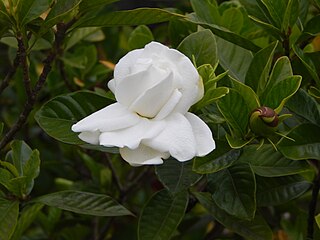
Gardenia jasminoides, commonly known as gardenia, is an evergreen flowering plant in the coffee family Rubiaceae. It is native to parts of South-East Asia. Wild plants range from 30 centimetres to 3 metres in height. They have a rounded habit with very dense branches with opposite leaves that are lanceolate-oblong, leathery or gathered in groups on the same node and by a dark green, shiny and slightly waxy surface and prominent veins.

Allium cristophii, the Persian onion or star of Persia, is a species of flowering plant in the family Amaryllidaceae, native to Iran, Turkey, and Turkmenistan, though grown as an ornamental bulbous plant in many parts of the world. It may be sold under the synonym of Allium albopilosum.
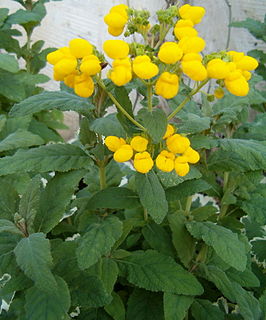
Calceolaria integrifolia, the bush slipperwort, is a shrub belonging to the genus Calceolaria and native to Argentina and Chile.
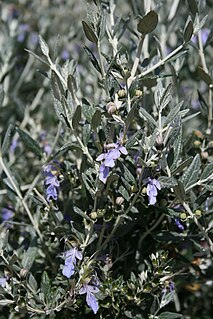
Teucrium fruticans is a species of flowering plant in the mint family Lamiaceae, native to the western and central Mediterranean. Growing to 1 m (3 ft) tall by 4 m (13 ft) wide, it is a spreading evergreen shrub with arching velvety white shoots, glossy aromatic leaves and pale blue flowers in summer.
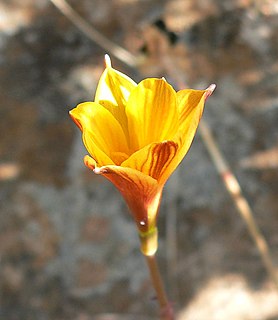
Zephyranthes tubispatha, synonym Habranthus tubispathus, the Rio Grande copperlily or Barbados snowdrop, is a species of flowering plant in the family Amaryllidaceae. It is a perennial bulb native to southern South America. It is widely cultivated as an ornamental and reportedly naturalized in the southeastern United States, much of the West Indies as well as Bermuda, eastern Mexico, India, Easter Island, and central Chile.

Celtica gigantea, commonly called giant feather grass, giant needle grass, or golden oats, is a species of flowering plant in the grass family Poaceae, native to southern Europe. It occurs in Spain and other Mediterranean countries. It is still widely referenced in the horticultural literature under its synonym Stipa gigantea.
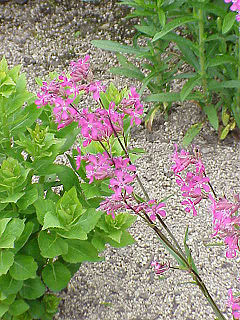
Viscaria vulgaris, the sticky catchfly or clammy campion, is a flowering plant in the family Caryophyllaceae.
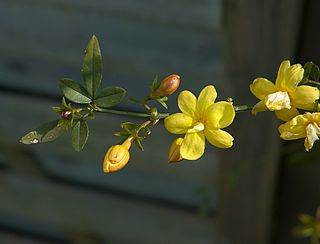
Jasminum mesnyi, the primrose jasmine or Japanese jasmine, is a species of flowering plant in the family Oleaceae, native to Vietnam and southern China. It is also reportedly naturalized in Mexico, Honduras and parts of the southern United States.
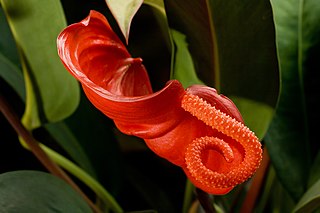
Anthurium scherzerianum, the flamingo flower or pigtail plant, is a species of Anthurium native to Costa Rica. It has gained the Royal Horticultural Society's Award of Garden Merit as an ornamental houseplant, kept at 15 °C (60 °F) or higher. It is naturally an epiphyte, growing on trees in the rainforest.

Calceolaria cana, the salsilla or zarcilla, is a species of flowering plant in the pocketbook plant genus Calceolaria, family Calceolariaceae, native to central Chile. Along with Calceolaria corymbosa and Calceolaria crenatiflora it has contributed to the Calceolaria Herbeohybrida Group of cultivars.




















